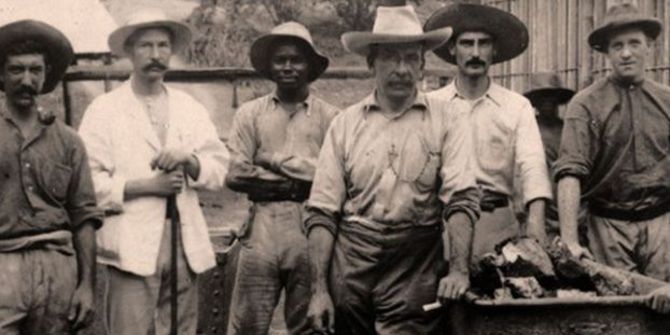Jesse Salah Ovadia describes this title by Celeste Hicks as providing an insightful window into contemporary debates around petro-development in Africa.
As Celeste Hicks notes in the conclusion to Africa’s New Oil, there has been ‘an unprecedented amount of interest and focus’ on the topic of new oil finds in Africa. What makes Hicks’ book unique is her perspective as BBC correspondent in Chad at a key moment in that country’s transition to an oil power and the depth of perspectives that inform her analysis.
The book opens with the battle of Am Dam in 2009, which Hicks covered for the BBC. The outcome of the battle, in which Chad decisively defeated rebels crossing from Sudan, is a metaphor for the power and significance of new oil in Africa. Hicks’ contacts and conscious decision to focus on the voices of citizens and civil society actors provides valuable insight. With engaging prose and an informal/personal style, she goes on to argue that Chad can also be used to better understand the issues and debates that have emerged from subsequent new oil finds in Niger, Ghana, Uganda and Kenya.
The first three chapters are devoted to the anchor case of Chad, picking up from the story of the now notorious failure of the World Bank’s Chad-Cameroon Development Project (CCDP) and continuing to discuss new Chinese investment in Chadian oil. Although the author seems not to be aware, there is a substantial literature on the World Bank’s folly in Chad. However, Hicks goes further in explaining exactly how the CCDP was supposed to address the problem of the resource curse. She then uses this analysis to understand both the World Bank’s failure and, more importantly, what lessons can be applied to Africa’s new oil producers.
failure of the World Bank’s Chad-Cameroon Development Project (CCDP) and continuing to discuss new Chinese investment in Chadian oil. Although the author seems not to be aware, there is a substantial literature on the World Bank’s folly in Chad. However, Hicks goes further in explaining exactly how the CCDP was supposed to address the problem of the resource curse. She then uses this analysis to understand both the World Bank’s failure and, more importantly, what lessons can be applied to Africa’s new oil producers.
Hicks provides nuanced answers to key questions about whether oil benefits Chad and the larger question of the validity of the resource curse hypothesis. Her overall argument after reviewing her other cases in East and West Africa is in line with more recent analyses of the ‘curse’ by other authors such as John Heilbrunn and myself; in her words, ‘today there is a good chance that oil extraction projects could be considered a “blessing” and an answer to a country’s economic woes’.
Due to the presence of China’s CNPC, Niger makes a useful comparison with Chad. Oil in Niger is desperately understudied, however Hicks finds little to say about the upstream petroleum industry since it is so new. Going beyond the stale ‘China threat’ analysis, she concludes that even ‘desperately poor’ countries like Chad and Niger show signs of being able to hold their own against large Chinese companies and benefit from Chinese investment in oil.
In contrast with Niger, much more has already been written about Ghana’s new oil industry. Hicks presents some of the main arguments advanced by Ghanaian civil society but does not manage to go as deep into key issues regarding the balance between revenue maximization and local content development or the value of Ghana’s special funds—in particular the Heritage Fund, which saves some of the revenues from petroleum for future generations—given the context of large public debt collaterialised against oil production.
The focus on local content in each chapter is a welcome aspect of the analysis. Hicks shows that even in CNPC’s oilfields local participation may be higher than commonly thought. However, the topic is covered more in-depth for Uganda and Kenya than for Ghana and without comparisons between the countries. The attempt to include a specific focus on women’s participation in Kenya’s oil industry, while tentative, offers a potentially interesting topic for further study.
Overall, Africa’s New Oil is a fascinating introduction to the topic of what I call petro-development in Africa, focused not on the classic cases of Angola and Nigeria but the emerging ones. As Hicks notes in the introduction, the oil price shock of 2014 came just as her book was going to press. With the drop in US imports of African oil, some aspects of the argument may already need updating—a problem those of us who write about African oil are all too familiar with. However, the book remains an insightful window into contemporary debates across the continent. Hicks’ optimism in spite of the myriad of challenges she relates is clearly drawn from the passion and vibrancy of the civil society actors she encountered.
Africa’s New Oil: Power, Pipelines and Future Fortunes by Celeste Hicks. Zed Books. 2015.
Jesse Salah Ovadia is a Lecturer in International Political Economy at Newcastle University. Follow him on Twitter @js_ovadia
The views expressed in this post are those of the author and in no way reflect those of the Africa at LSE blog or the London School of Economics and Political Science.





